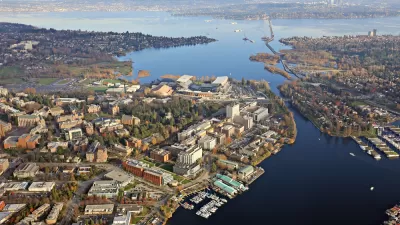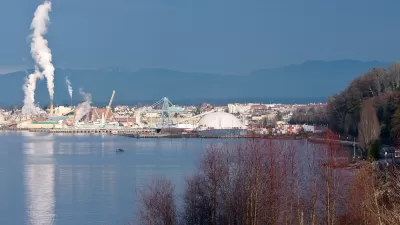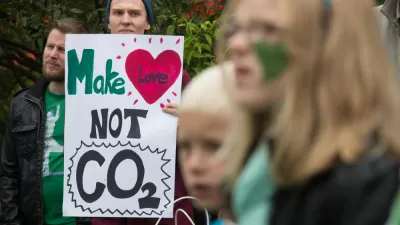Environmental, labor, and community groups in Washington State filed an initiative for placement of a carbon fee on the November ballot. Unlike a similar measure in 2016, revenues would be used to mitigate emissions.
"What happened in the Evergreen State is startling: A Democratic governor, presiding over a Democratic legislature in a West Coast state, could not pass a substantial climate policy out of the statehouse," writes Robinson Meyer, an associate editor at The Atlantic.
But the next day, March 2, "backers of a carbon fee had already filed an initiative to the people in its place," reports Bellamy Pailthorp from the Seattle offices of KNKX Public Radio News. Signature gathering begins next month.
Readers may recall that Initiative 732, aka "Washington State's Big Climate Policy Experiment," was rejected by over 59 percent of voters in November 2016. However, environmentalists were divided on the measure. Green groups who wanted revenues used to reduce emissions rather than the sales tax are among those backing the new measure.
"A broad coalition of environmental and community groups had been promising for months that they would file a voter’s initiative if Inslee’s carbon tax failed," adds Pailthorp.
Mike Stevens, Washington State Director for the Nature Conservancy says dozens of groups have been working together on this. They’ve been convening broad-ranging conversations about the new initiative for more than three years.
Jeff Johnson, President of the Washington State Labor Council, AFL-CIO, added, "It’s the broadest and deepest coalition that I’ve ever been involved in Washington State in the 32 years I’ve been here. It is made up of organizations of color, faith-based groups, environmental groups, tribes, labor, public health, women’s groups – it’s really, really exciting.”
The new initiative puts a pollution reduction fee on carbon, not a tax. That’s an important distinction, backers say, because it means the revenue has to be invested in solutions to the pollution.
The investments will include clean energy projects that create jobs or restoration work to make forests and rivers more resilient. Money would also go to communities disproportionately affected by climate impacts.
The fee would start at $15 per metric ton, beginning in Janary 2020. It would go up the next year by $2 per year until the state's 2035 greenhouse gas reduction goal is met and the state's emissions are on a trajectory that indicates compliance with the state's 2050 goal is likely.
"The proposed carbon tax in Washington would have imposed a $12 tax on every ton of carbon pollution," adds Meyer for The Atlantic on March 2, noting that had it passed, it would have been the first in the U.S. and the second in North America after British Columbia.
West Coast climate hawks may soon have another chance for a win. Oregon legislators are considering a “cap and trade” bill that would limit carbon pollution statewide and create a market where companies could bid for the right to emit it. They could vote as soon as Friday.
The bill didn't pass, reports the Associated Press. Gov. Kate Brown (D) and state Senate leaders expressed confidence it would pass next year as the 2018 legislative term ended Saturday.
California has been operating the nation's only state-run cap-and-trade program since November 2012. The program was renewed last year with a two-thirds vote of the legislature to avoid a court battle under Proposition 13 by opponents who view it as a tax. At its latest quarterly auction last month, permits sold for $14.61 per ton of carbon emissions.
Reporting for The New York Times on Gov. Inslee's decision to withdraw the carbon tax bill from the state Senate when it became clear he didn't have the votes for passage, Coral Davenport notes the speculation on his political ambitions.
If he does run for president, Governor Inslee is expected to make climate change central to his platform. Governor Inslee, who has spent the past decade of his political career focusing on climate change, earning the sobriquet “greenest governor in America..."
As for legislatively imposed carbon taxes, Davenports reports that "carbon tax bills have been introduced in the legislatures of Utah, Maryland, New York, Hawaii, Rhode Island, Vermont, Maine and Washington, D.C."
FULL STORY: Inslee’s Carbon Tax Fails, But Supporters Have Already Filed An Initiative

Maui's Vacation Rental Debate Turns Ugly
Verbal attacks, misinformation campaigns and fistfights plague a high-stakes debate to convert thousands of vacation rentals into long-term housing.

Planetizen Federal Action Tracker
A weekly monitor of how Trump’s orders and actions are impacting planners and planning in America.

In Urban Planning, AI Prompting Could be the New Design Thinking
Creativity has long been key to great urban design. What if we see AI as our new creative partner?

King County Supportive Housing Program Offers Hope for Unhoused Residents
The county is taking a ‘Housing First’ approach that prioritizes getting people into housing, then offering wraparound supportive services.

Researchers Use AI to Get Clearer Picture of US Housing
Analysts are using artificial intelligence to supercharge their research by allowing them to comb through data faster. Though these AI tools can be error prone, they save time and housing researchers are optimistic about the future.

Making Shared Micromobility More Inclusive
Cities and shared mobility system operators can do more to include people with disabilities in planning and operations, per a new report.
Urban Design for Planners 1: Software Tools
This six-course series explores essential urban design concepts using open source software and equips planners with the tools they need to participate fully in the urban design process.
Planning for Universal Design
Learn the tools for implementing Universal Design in planning regulations.
planning NEXT
Appalachian Highlands Housing Partners
Mpact (founded as Rail~Volution)
City of Camden Redevelopment Agency
City of Astoria
City of Portland
City of Laramie





























